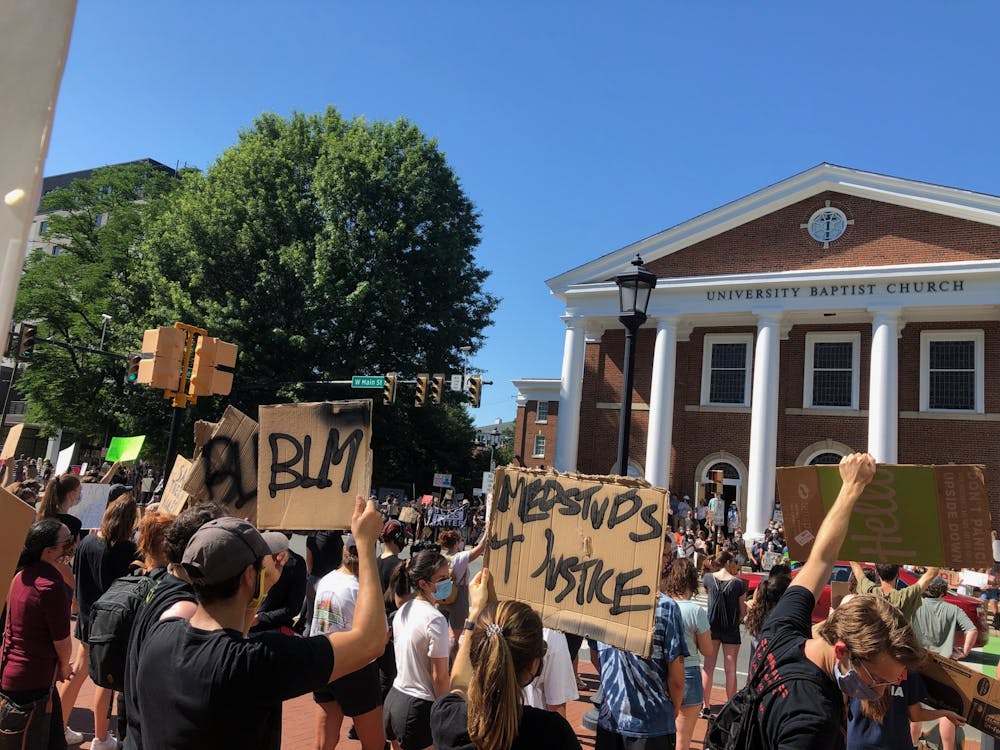Hundreds of protesters gathered in front of University Baptist Church at 4 p.m. Monday to show support for the demands of the Movement for Black Lives. It was the second consecutive day of protests planned in Charlottesville in response to the murder of George Floyd by police, which also included local demonstrations May 30 and June 7.
Starting at around 4:30 p.m., protesters began to march down West Main Street. There were police present throughout the march, with a police car driving ahead of the protesters and both police cars and police officers with bicycles standing at intersections.
Participants held signs condemning systemic police violence against Black people in the U.S. with phrases including “No Justice, No Peace,” “Black Lives Matter” and “Silence is Violence.” Protesters repeated multiple chants throughout the march, including “Whose streets? Our streets,” “Hands up, don’t shoot” and “I can’t breathe.”
When the march returned to its starting point around 6 p.m., protesters formed a semicircle around the steps of University Baptist Church that covered West Main Street. At least 200 protesters remained until the end of the event. Water and food were provided to those who needed it, and medics were there to help any protesters who started to feel ill after the march.
The leaders of the protest called for all protesters of color to gather near the steps, and offered up the microphone to those who came to the center.
Many of the protesters identified themselves as people who were not originally from Charlottesville. One community member described how much of a shock the racism she has experienced in Charlottesville was to her when she moved.
“I’m not from here, and I didn’t learn about racism until I came here,” she said. “I actually changed how I act because of the people that I was around.”
One speaker who introduced himself as Jay spoke about the emotional toll of systemic racism, citing the constant threat of police brutality and the disproportionate impact of COVID-19 on communities of color due to structural barriers to healthcare and a greater likelihood of working essential jobs.
“I know we’re tired,” Jay said. “We’re tired of the systemic racism that exists in this country, we’re tired of being denied healthcare for COVID … Am I next? Is anyone else in this crowd next? Who knows. And that’s why we’re here today.”
Multiple speakers also mentioned the positive impact of Freedom Schools in teaching them how to show up politically for their communities. Freedom Schools are six-week summer reading and cultural enrichment programs that focus on empowering youth to make a difference in the world. One protester who introduced himself as Norman described his experiences as both a student and a teacher in a Freedom School.
“I went to Freedom School for three, four years.” Norman said. “Two of those years I was a student at that Freedom School. The other two years, I was a teacher at that Freedom School. Since I was a little kid I saw people that looked like me, people from my community, that came back to give back.”
While one individual was speaking on the church steps, two white people began to yell in opposition to what the speaker was saying from the opposite side of the street. Over 100 people walked up to them and escorted them down Jefferson Park Avenue.
Although no violence occurred at the protest, an organizer was clear that she didn’t want protesters to publicize the protest as “peaceful.”
“There is nothing peaceful about protest,” she said. “Protests are the voices of the unheard speaking out against oppression. There is nothing peaceful about a protest.”
The organizer also elaborated on the specific demands that the protesters were gathering to support.
“Right now there’s a list of demands that we have sent publicly to our City,” she said. “We want to demilitarize the police, we want to get school resource officers out of our school systems, we want to put an end to pre-trial detention, we demand the City, county and state to increase the number of people being released from jail and prisons, especially during the pandemic, we demand people that are on work release get released immediately [and] we demand the police end targeted harassment and surveillance of Black and Brown communities.”
At the end of the protest, organizers called for participants to take concrete steps after the protest to affect change in the Charlottesville community. These steps included contributing to bail funds, supporting Black-owned businesses and emailing local government officials. They specifically directed protesters to an email through Defund12.org and asked participants to email representatives of City and county schools about removing school resources officers — who are stationed in many public schools across the country.
Many civil rights activists consider them to be a significant contributor to the school-to-prison pipeline — a growing trend wherein students of color are more likely to be suspended, expelled or arrested in schools, pushing them out of schools and into the court system at a young age.
A 2011 report by the Justice Policy Institute found that schools with SROs have a rate of disorderly conduct arrests almost five times higher than schools without SROs. In the Charlottesville City Public School System, there are three SROs — one for the high school, one for the middle school and one for all seven elementary schools. In the Albemarle County Public School System, there are two SROs on staff directories — one at Monticello High School and one at Western Albemarle High School. On Tuesday, the superintendent of Charlottesville City Schools said they are listening to the public and will reconsider the role of SROs.







